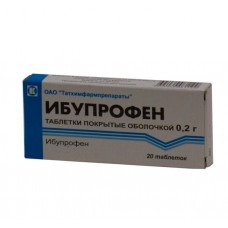Expiration date: 08/2025
The composition and form of issue
Ibuprofen tablet, coated:
1 tablet contains ibuprofen 200 or 400 mg,
10, 20, 30, 50, 100 pack.
Ibuprofen effervescent tablets are round, white to yellowish-white in color, with weak smell of lemon.
1 tablet contains ibuprofen 200 mg,
10 or 20 PCs in plastic tube, 1 or 2 tubes in a cardboard box.
Ibuprofen suspension for oral administration homogeneous, from yellow to light orange, with the smell of orange.
5 ml ibuprofen suspension 100 mg,
100 ml in bottles of dark glass, 1 bottle complete with a measuring spoon in a cardboard bundle.
Pharmacological action
Ibuprofen is a nonsteroidal anti-inflammatory drug derived from phenylpropionic acid. It has anti-inflammatory, analgesic and antipyretic effects. The effect of the drug is due to inhibition of prostaglandin synthesis by blocking the enzyme cyclooxygenase.
Suppresses platelet aggregation. Prolonged use has a desensitizing effect.
Ibuprofen, indications for use
Rheumatoid arthritis, osteoarthritis, articular syndrome with exacerbation of gout, psoriatic arthritis, ankylosing spondylitis (ankylosing spondylitis), cervical spondylosis, Barre syndrome-LEU (cervical migraine, vertebral artery syndrome), neuralgia, myalgia, tendonitis, bursitis, tenosynovitis, nerve atrophy, stretching of ligaments, hematomas, sciatica, traumatic inflammation of soft tissue and musculoskeletal, fevers of various origins (including after immunization), symptomatic treatment of influenza and SARS, postural hypotension when taking antihypertensive drugs, nephrotic syndrome (to reduce the severity of proteinuria). As an aid: infectious and inflammatory diseases of ENT organs (tonsillitis, pharyngitis, laryngitis, sinusitis, rhinitis), bronchitis, pneumonia, inflammatory processes in the pelvis, adnexitis, primary dysmenorrhea, algodismenorrhea, postoperative pain, headache and toothache, panniculitis.
Contraindications
Hypersensitivity, ulcers disease stomach or duodenal ulcers (in the acute stage), ulcerative colitis, diseases of the optic nerve, scotoma, amblyopia, impaired color vision, liver cirrhosis with portal hypertension, "aspirinova" asthma (provoked by taking ASA or other NSAIDs), heart failure, swelling, arterial hypertension, hemophilia, hypocoagulation, leukopenia, hemorrhagic diathesis, hearing loss, pathology of the vestibular apparatus, the deficit glukozo-6-fosfatdegidrogenaza, pregnancy (III trimester).
Be wary, hyperbilirubinemia, pregnancy, lactation, peptic ulcer of stomach and duodenal ulcers (in history), gastritis, enteritis, colitis, liver and/or kidney failure, blood diseases unclear etiology, children's age (till 12 years).
Method of application and doses
Inside, after eating.
With rheumatoid arthritis, 800 mg is prescribed 3 times a day.
In osteoarthritis and ankylosing spondylitis, Ibuprofen is used 400-600 mg 3-4 times a day.
When juvenile rheumatoid arthritis drug is used at a dose of 30-40 mg / kg body weight per day.
In soft tissue injuries, ligament sprains drug is prescribed for 600 mg 2-3 times a day.
In case of moderate intensity pain syndrome, the drug is prescribed 400 mg 3 times a day. The maximum daily dose of 2.4 g.
Children over 12 years of age the initial dose-150-300 mg 3 times a day, the maximum dose - 1 g, then - 100 mg 3 times a day, with juvenile rheumatoid arthritis - 30-40 mg/kg/day in several ways.
To reduce body temperature 39, 2°C and above - 10 mg/kg/day, below 39, 2°C - 5 mg/kg/day.
Side effect
From the digestive tract: nausea, vomiting, abdominal pain, heartburn, anorexia, diarrhea, flatulence, NSAIDs-gastropathy.
From the nervous system: headache, dizziness, hearing loss, tinnitus, insomnia, excitement, drowsiness, depression.
From the CCC: cardiac failure, tachycardia, increased blood pressure. From the urinary system: edema syndrome, impaired renal function.
Allergic reactions: skin rash, itching, urticaria, Quincke's edema, rarely - aseptic meningitis (more often in patients with autoimmune diseases)), bronchospasm.
From the side of blood: anemia, thrombocytopenia, agranulocytosis, leukopenia.
Special instruction
With caution, prescribe the drug to patients with impaired liver, kidney, cardiovascular disease, with a history of gastric ulcer and / or duodenal ulcer, bleeding from the gastrointestinal tract.
In comparison with other NSAIDs, Ibuprofen has the least ulcerogenic action on the mucous membranes of the gastrointestinal tract.
With prolonged use of the drug, it is necessary to monitor the function of the liver and/or kidneys, peripheral blood picture.
During pregnancy, the drug should be used only as directed by your doctor.
Drug interaction
With simultaneous appointment Ibuprofen can cause a decrease in the diuretic effect of furosemide.
The joint use of Ibuprofen increases the effects of diphenylhydantoin, anticoagulants cumarin series of oral hypoglycemic drugs.
Storage conditions
List B. in a dry, dark place. Out of reach of children.


